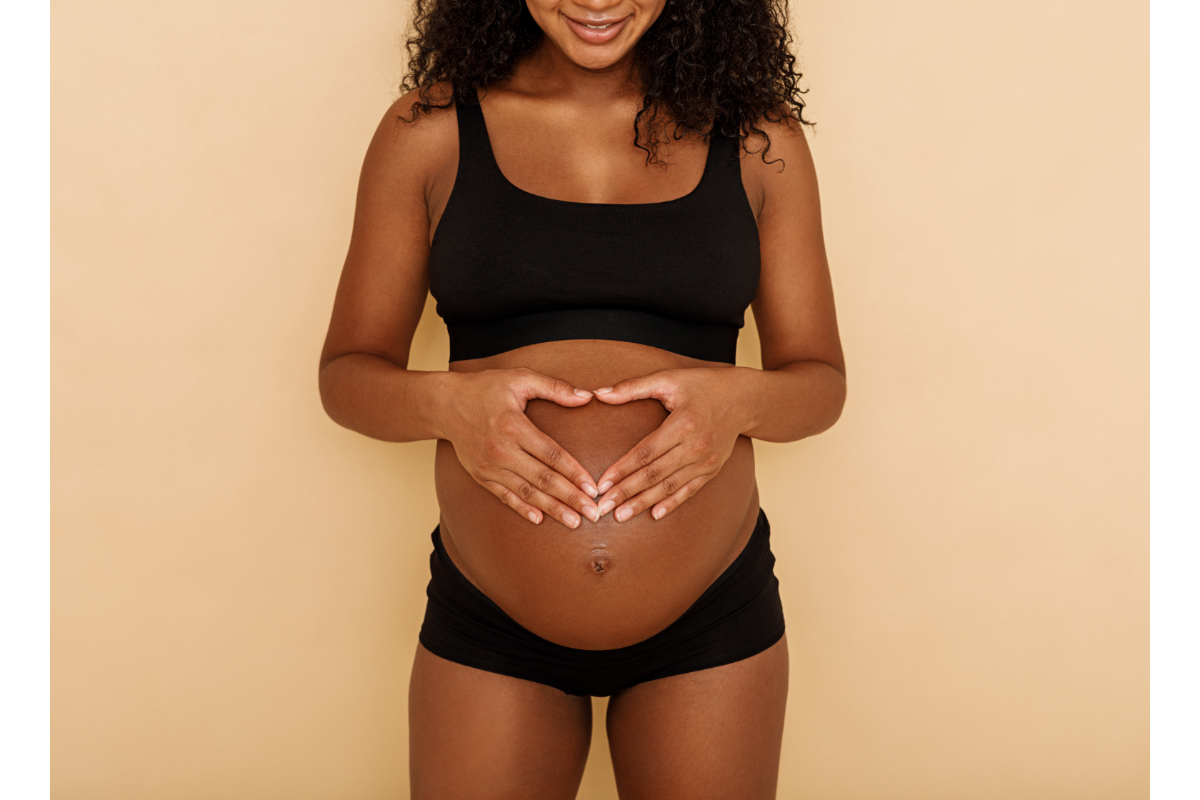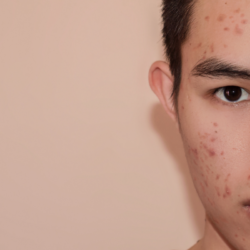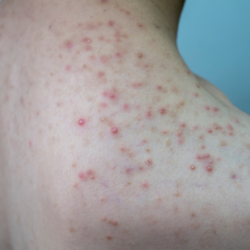Are you pregnant and pimples are appearing on your face, back or chest? Don’t panic, you’re not alone! Acne during pregnancy is a very common phenomenon, caused by hormonal changes.
Yet some mums-to-be have glowing skin, while others have to deal with skin eruptions. Why this difference? And above all, how can you look after your skin without putting your baby at risk? Here’s everything you need to know!
Acne is a skin condition that manifests itself as pimples, blackheads and inflammation. During pregnancy, hormonal changes stimulate the sebaceous glands, which can lead to an overproduction of sebum and the appearance of pimples.
Why does acne appear during pregnancy?
If you had clear skin before your pregnancy, it can be frustrating to see pimples appear without warning. But don’t panic, there is an explanation! These breakouts are mainly due to the crazy hormones and physiological changes that accompany this period.
Hormones gone wild
You may have heard of the famous pregnancy ‘glow‘… but the reality is sometimes different. In fact, your body produces a lot more progesterone, a hormone that stimulates the production of sebum. The result? Oilier skin, clogged pores… and the appearance of pimples!
Why does sebum become a problem?
Basically, sebum is your ally: it protects and moisturises the skin. But too much of it clogs pores, especially when it mixes with dead skin cells. The result: bacteria proliferate and acne sets in.
Imagine a tube of toothpaste that isn’t closed properly: if the product accumulates at the mouth, it ends up blocking the exit. It’s a bit like what happens with your pores!
Other contributing factors
But hormones aren’t the only factors involved! Other factors can also play a role in the appearance of acne:
- Stress: The more stressed you are, the more cortisol your body produces, a hormone that stimulates sebum production. 👉 Try meditation or prenatal yoga!
- Diet: Refined sugars and dairy products can accentuate skin inflammation. 👉 Favour foods rich in omega-3 (oily fish, nuts, avocado)!
- Unsuitable skincare products: Some overly aggressive products dry out the skin… which reacts by producing even more sebum!👉 Opt for gentle, moisturising, non-comedogenic cleansers.
How does acne affect pregnant women?
Pregnancy is often associated with a period of well-being and fulfilment, but this is not always the case. Acne can be a source of frustration, especially when it affects the face, chest or back. When you’re expecting to glow with the famous ‘ pregnancy glow’, these imperfections can be disconcerting and put a strain on your self-confidence.
Causes of acne in pregnant women
But why do some women develop acne during pregnancy, while others have glowing skin? As always, it’s a combination of hormonal changes, skin sensitivity and lifestyle. Here’s why your skin may react differently during these nine months.
Hormonal changes
Unsurprisingly, hormones play a key role. During pregnancy, your body produces more progesterone, an essential hormone for maintaining pregnancy… but which also has the side effect of increasing sebum production. The result? Oilier skin, clogged pores and blemishes.
Increased skin sensitivity
Your skin may also become more reactive than before. A skincare product that you used without worry before can suddenly cause redness, itching or even pimples. The result: you hesitate to try new products for fear of making the situation worse.
Diet and nutrition
Even if diet doesn’t directly cause acne, it can play an aggravating role. Refined sugars and dairy products, for example, tend to stimulate certain hormones linked to sebum production. Conversely, a diet rich in fruit, vegetables and omega-3s can help maintain a more balanced skin.
Stress and lifestyle
Stress is an often underestimated factor. Yet the more stressed you are, the more your body releases cortisol, a hormone that stimulates sebum production. The result: acne can intensify. Taking time for yourself really helps: a moment of meditation, a prenatal yoga class or simply a good book can calm your mind… and your skin!
Types of acne encountered, areas affected and levels of severity
Pregnancy acne is not limited to small red spots. It can also appear in the form of blackheads, more painful subcutaneous cysts or inflammatory pustules.
How can acne during pregnancy be treated without risk?
When you’re pregnant, you want to avoid products that are harmful to your baby while taking care of your skin. Fortunately, there are gentle and effective solutions to limit acne without danger. Here’s what really works and what you should avoid!
What skincare products should I use for acne in pregnant women?
The good news is that you don’t need a complicated routine to improve your skin! Here are the three essential steps for clearer skin during pregnancy:
Cleanse gently: use a soap-free, alcohol-free cleanser, such as a water-based gel or gentle foam.
Moisturise without clogging: choose a light, non-comedogenic cream enriched with niacinamide or aloe vera.
Protect your skin: apply a mineral sunscreen (zinc oxide or titanium dioxide) to prevent pigmentation spots.
👉 Tip: avoid overly aggressive cleansers that strip the skin. They can stimulate sebum production even more and make acne worse!
Ingredients authorised during pregnancy
Not all ingredients are suitable for pregnant women. Here are those that you can use without risk:
Azelaic acid: anti-inflammatory and effective against pimples and spots.
Niacinamide (vitamin B3): regulates sebum production and soothes the skin.
Green or white clay: absorbs excess sebum and gently purifies the skin.
Aloe vera: moisturises and soothes inflammation.
👉 Tip: apply a clay mask once a week to help purify your skin without drying it out.
Things to avoid
Certain substances are prohibited during pregnancy, as they may be toxic for the baby.
Retinoids and vitamin A derivatives (retinol, adapalene, tretinoin) → Risk of foetal malformations.
Salicylic acid in high concentrations → Avoid as a peel or concentrated serum.
Essential oils not recommended (such as sage or rosemary) → Risk of hormonal effects.
If in doubt, always ask your doctor or dermatologist for advice.
Reading labels
It’s essential to read product labels carefully and look for statements such as “safe during pregnancy” or “approved by a dermatologist”.
Correct use of products
Excessive or incorrect use of products can irritate the skin, even if the products are safe. It is essential to follow the product instructions and the health professional’s recommendations.
Preventing acne during pregnancy: good habits to adopt
Can acne be completely avoided during pregnancy? Not always, as hormones play a major role in its appearance. However, adopting certain habits can really make a difference and help keep your skin clearer.
Diet, for example, has a direct impact on the condition of the skin. Eating a balanced diet rich in fruit, vegetables and omega-3s can help regulate sebum production and limit inflammation. Avocados, oily fish and nuts are excellent allies in nourishing the skin from the inside out.
Hydration also plays a key role. Drinking enough water every day eliminates toxins and keeps skin supple and well hydrated, helping to reduce skin imbalances linked to hormonal fluctuations.
Stress can also aggravate acne by stimulating the production of cortisol, a hormone that promotes excess sebum production. Finding moments to relax is therefore essential: meditation, prenatal yoga or even a few breathing exercises can help restore emotional balance and, by extension, soothe the skin.
Finally, sleep should not be neglected. Quality rest allows the body to better regulate its hormones and encourages cell regeneration. A good night’s sleep not only helps to keep your skin healthier, but also helps you to get through this unique period better.
Healthy skin, even during pregnancy!
Pregnancy acne can be a trial, but it’s temporary! With the right skincare products, a balanced diet and good stress management, your skin will regain its balance after the birth.
A little personal advice: don’t put too much pressure on yourself. Your skin will change over the months, and that’s normal. The important thing is to take care of yourself and enjoy this wonderful adventure!





